I just finished DC’s Wonder Woman Chronicles volume 1, which collects Wonder Woman’s appearances in chronological order. This first volume collects Wonder Woman’s first appearance in All-Star Comics 8 (December 1941-January 1942) through Sensation Comics no. 9 in September 1942, and also includes Wonder Woman number 1.
I’ve already talked about several of these comics in the Bound to Blog series (for example, I talk about Wonder Woman #1 here, and Sensation Comics #1 here.) But there are a couple of things that struck me while reading the collection as a whole.
No Intro
There’s absolutely no introductory material at all, unless you count a small note in the table of contents that says, “The comics reprinted in this volume were produced in a time when racism played a larger role in society and popular culture, both consciously and unconsciously.” That is undeniably true
but still, it seems like there might be more to say. Who wrote these comics? Who drew them? How popular were they? What did people think of them? Why are we reprinting them?
Of course, the answer to the last question is basically, “because they are there,” and also, “Wonder Woman still has a fanbase, so if you stick her face on a cover, you can sell some copies, even if no one really thinks this material is particularly worthwhile — or, for that matter, thinks anything about it at all.”
Not that this is just about Wonder Woman. I’m sure DC’s other chronicles editions don’t have intros…the point is to make them as cheap as possible, I’m sure, in the hopes of selling to a not-especially-well-defined audience of WW fans, kids, and the curious or confused. But even the DC Wonder Woman Archive Edition (hard backed, more expensive, slightly more material) has an intro (by folk singer Judy Collins) that is more along the lines of an extended blurb than an actual effort to provide some context.
I’m sure some might say this is for the best — why have some professor get between the kids and their pop culture ephemera? The problem is that pop cultural ephemera is ephemera; if that’s what it is, why reprint it? And, indeed, DC’s various archival projects have tended to founder from lack of interest, being released at glacial speeds before instantly going out of print. Those boring professors, it turns out, are part of minimal cultural validation — and without that minimal validation, old pop cultural ephemera is largely irrelevant.
Steve Trevor, He-Man Convalescent
Steve Trevor appears on the very first page of Wonder Woman’s first story in All Star comics. In that debut appearance, he’s unconscious.
He then stays unconsious throughout the entire tale. He gets some moments of lucidity in flashback, but by the end of the story, he’s still conked out. It’s only in the 2nd WW tale (in Sensation Comics #1) that he comes to his senses. After that he’s in the hospital convalescing. He sneaks out when he learns of deadly danger to the country…but by the end of the comic, he’s back in bed again, with WW as Diana Prince (who changed places with his nurse…don’t ask) caring for him. Next issue he’s up and around, but by the end:
It’s only in Sensation Comics 3, the fourth WW story, that Steve Trevor escapes from the hospital, forcing Diana Prince to get a job not as his secretary, but as his boss’ secretary.
In other words, the ur-Steve Trevor, as Marston conceived of him, is not a fighter nor a love, but a hospital patient. The true Steve Trevor is the wounded — or, perhaps more accurately, infantilized — Steve Trevor.
In Women’s Fiction of the Second World War: Gender, Power, and Reistance, Gill Plain argues that:
War creates a situation in which the gender debate is subsumed by a meta-narrative of power. It represents a conflict that divorces and prioritises the division between activity and passivity from the founding binary opposition masculine/feminine. War almost represents itself as a constructive reinscription, or even a rejection of the age-old formulations of gender…. In the course of purusing the division between a non-gender-specific activity and passivity, woman is ‘decentered’… The woman has once again become invisible.
For Plain, then, war destabilizes gender by divorcing activity/passivity from gender — but in so doing, it erases women’s difference, and so erases women.
I think, though, Marston, radical feminist and dirty old coot, has found a way around this dilemma. He uses the destabilizing effect of war to create an emasculated hero — the wounded soldier, whose incapacity is the sign of his boldness and strength. But for Marston, the fact that passivity is disconnected from women does not result in ungendering. On the contrary, it becomes a masochistic fetish. Steve regresses, authority is upended…and patriarchy becomes matriarchy. Woman isn’t erased; she’s explicitly elevated as caregiver and (maternal) hero. Which is (in Marston) what men want:
That’s an awesomely, fluidly flaccid twisted leg Peter has drawn there — and Steve is, of course, explicitly getting off on his own castration. War for Marston isn’t a disaster so much as an opportunity for men to embrace their weakness…and let women take over.
Myself for a Rival
A number of the stories in this volume end with a panel like this
What’s interesting about this is that…that’s it. The trope is stated…and then dropped, over and over again. The love triangle is pointed at, but never really becomes central to the plot (the way it is with the Clark/Lois/Superman triangle, even in the early years to some extent.)
It seems like, for Marston, there’s a pleasure in the masquerade of changing identities, and a frisson in the unrequited melodrama…but very little interest in actually presenting either Diana or Wonder Woman as angst-ridden or, for that matter, weak. There’s almost a condescension about it, like she’s pretending she’s worried to make Stevie feel important, the little darling. As I’ve mentioned before, double identities in Wonder Woman feel more like play than agonized bifurcation, a polymorphous feminine role-play rather than an agonized Oedipal bifurcation. After Marston died, of course, Diana’s love vicissitudes move from marginal tease to major plot points. With Marston’s feminism removed, everybody seemed more comfortable with a passive object of desire, rather than with the all-powerful Mommy, stooping to love.
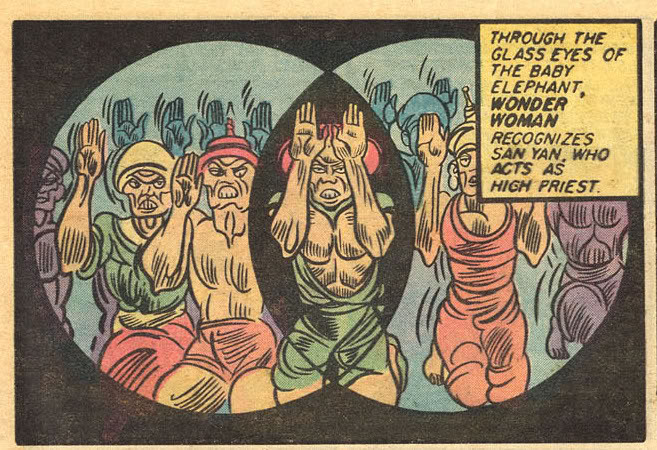
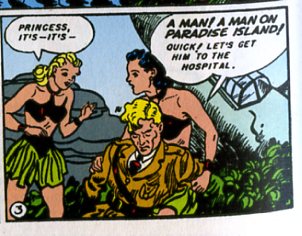
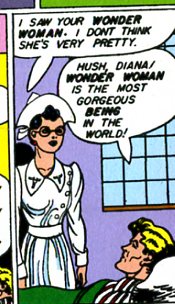
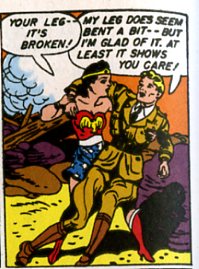
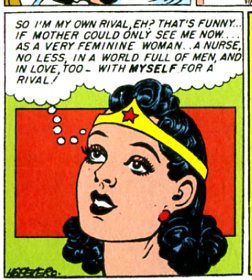
Noah, where did you first hear about Marston’s masochist/feminist outlook? I was looking around the internet for biographies of him, but I couldn’t find much. (Sorry if you’ve mentioned your sources before, but I usually skip your Wonder Woman essays because I haven’t read many of the comics.) My guess is that it won’t be mentioned in that new Wonder Woman documentary. I remember Trina Robbins writing a book review for TCJ where she mocked the idea that Wonder Woman’s costume was meant to appeal to male domination fantasies.
I just read Venus in Furs and some stuff about Leopold Von Sacher-Masoch, and I guess there was some weird interplay between masochism and feminism from the beginning. Sacher-Masoch was a big advocate for women’s rights (which are mentioned as kind of an afterthought at the very end of Venus in Furs), although apparently he treated his second wife like crap and bullied her into whipping him.
Hey Jack. It’s not any big secret; Marston talks about bondage and submission himself in some of his essays on WW and comics. I first heard about it through Dirk Deppey, who mentioned it on his blog. Les Daniels talks about it in his Complete History, also. The best summary of the literature is probably Ben Saunders, who has an excellent chapter on WW in his book “Do the Gods Wear Capes?”
Ben says that some critics — and he mentions Trina — tend to avoid talking about Marston’s fetish aspects, while others (like Douglas Wolk) seem to think that the fetish elements must be opposed to, or undermine, the feminism. Ben’s view is closer to mine, which is that the fetish and the feminism are explicitly intended to reinforce each other (though of course it doesn’t necessarily always work, depending on your perspective.)
One interesting omission from almost all biographies I’ve seen is the fact that Marston’s wife and mistress were certainly lovers themselves; it wasn’t just a polygamous relationship but a polyamorous one. I presume there’s a reluctance to “out” them — but is a lesbian relationship really more shocking than a polygamous one? It also seems like it’s pretty important in terms of the lesbian hints in WW; Wertham was not making that shit up.
I’m delighted that DC is printing these el cheapo editions; I wish they’d do it for the handful of their other comics from the 40s that don’t suck. (Plastic Man, Captain Marvel, and who else?)
You’ve got to wonder about some of the other series, tho’, especially Batman and Superman. Sure, they’ve got cultural currency, but how many volumes of their “Chronicles” can somebody buy before they realise that most of their early stories (say, the first 15 years, at least) are really, really shitty? You’re right to insinuate that this “line” of reprints is probably going to peter out soon enough, like almost every other half-baked initiative of theirs…
Thanks, I’ll look for Do the Gods Wear Capes?.
I kind of like the siegel/shuster superman; they’re not great art or anything, but they have a charming energy.
The early batman comics, though…that stuff’s unreadable.
I actually was getting the Superman and Batman Chronicles from the library for awhile, thinking that this constituted some kind of historical research into the superhero genre. The first volume or two of the Superman stories are fun, just because it seemed like such an odd take on Superman…(and realizing how odd it is that the “original” versions now seem so odd)…but really, it became a struggle to get through them (I think I read 8 vols.) After awhile they settle into pretty indiscriminate suckitude. The Batman stories are even more terrible… Occasionally something interesting happens (the first or second Joker story was clever)…but it’s mostly just one thing after another–and none of them particularly interesting.
There are now Flash and Green Lantern chronicles too, but I’m pretty sure they start with the Silver Age –Barry Allen and Hal Jordan—and ignore their “Earth 2” predecessors. Don’t know if that makes them more likely to be readable or not.
I’ve read some silver age flash. I’d make an argument for the covers as absurdist art that’s at least somewhat worthwhile, but getting through the actual comics is always a slog.
Wonder Woman really is better. I laughed out loud multiple times reading through the WW chronicles. And Harry Peter’s art…I never grow tired of it.
yeah, I was talking about their (I hate this phrase) “golden age” reprints. The writing on those early Supermans is at least interesting, with socialist Superman and tough-gal Lois, but the art is shite. And Batman: bad pulp swiped badly.
But I’ll fight to the death for Carmine Infantino Flash (reprinted in the Flash Chronicles). Infantino has a really interesting way of staging action that’s almost Brechtian, plus refined character design and the most ectomorphic superheroes this side of Ditko’s Spider-Man.
A comic that successfully mixes superheroes and horror is Jojo’s Bizarre Adventure. For 5-6 chapters (half a volume), the heroes are tormented in gory and inventive ways by the villains; at which point, there will be a sudden turnaround, and they will utterly crush the villain, often through their wits, sometimes through the use of godlike powers. Then the cycle will repeat.
First half of my comment was eaten! That was a response to your linked “superdick” entry, with a prefacing stating that I know you wrote it several years ago.
Aha! Thanks Subdee; I thought the first half of your comment was unusually mysterious.
The first image looks good, but all the others are the usual garish, flat, DC Archives redoings. Why the difference?
Good eye, Domingos. The first is I believe scanned from the original comic. The rest I scanned myself from the DC Chronicles edition.
The quote about war made me think about two things– Simone Weil’s characterization of violence as a condition of being in thrall to power, and C.S. Lewis’ observation that we are all female in relation to God. It does undermine the salvific power of masochism, but it also problematizes the presumed nonviolence of the gay utopia/ capitalist biopower.
Weill and Lewis are both good people to bring up. I”m actually hoping to write a longer essay about this for publication, and haven’t quite worked it all out yet…but there’s a fair bit of feminist debate about the salvific power of masochism. Tania Modleski in Feminism Without Women is very skeptical; Kaja Silverman in Male Subjectivity at the Margins is more positive about the possibility.
Are there any reprints of this material which present the work with grain and benday-dots? I can’t stand this kind of garish ‘remastered’ presentation. It seems to be standard for DC and Marvels reprints of their vintage material and comes damn close to totally ruining my enjoyment of – for example – 60s Kirby.
I think there’s some examples of digital versions shot from the originals floating around the internets, but if your looking for official reprints, you’re going to be looking for a very, very long time. I guess it’s possible someone will do right by Kirby some day since he’s got some cultural cache, but pretty much nobody gives a crap about the Marston/Peter WW. If they can’t even bother to write an introduction for it, the chances that they’re going to spend a lot of time on better reproductions is slim at best.
It’s true, although I will say that the recentish collections of the Fourth World material did a decent job imo. The Marston/Peter WW is my favourite superhero run bar none and it would be so nice to see it treated with some aesthetic delicacy. Marvel and DC are such horrible custodians of their ‘properties’. Has anybody seen the Steranko Nick Fury reprint? Ugh.
The images are amazing– I really should get some Wonder Woman in my life.
I guess those titles say it all (Male Subjectivity at the Margins vs. Feminism s/o Women) as far as respective optimism is concerned. I don’t see either sadism or masochism as inherently virtuous, frankly– active vs. passive aggression, it’s still all about gratification.
Masochism really is super capitalist- making contracts, releasing boundaries. The anarchy Benjamin talks about at the core of bourgeois society is one of freely orchestrated debasement. The fact that sadists are rewarded by such a system should be unsurprising, but it is kind of interesting that “make love not war” kind of ends up being redundant (oxymoronic)?
Re virtuous masochism, I would say, as with most things, that it depends. I would say that eschewing gratification is holding morality to a masochistic standard, yes?
Modleski is really good at showing how masochism and misogyny go together; the law is mocked by making women the law (she has a great sneer at Derrida when he suggests that, where she says feminism should not allow itself to be appropriated for one man’s war on western metaphysics.) At the same time, I think Marston misogyny, coupled with his very conscious radical feminism, gets him to a place that maybe even Modleski could be okay with (it was okay with Gloria Steinem, anyway….)
Speaking of Gloria Steinem and Wonder Woman, I remember hearing an NPR interview many years ago with some male writer or artist who described his 70s-era work on the Wonder Woman comic. He had created a sequence of several issues in which the character became more contemporary and started wearing a karate outfit. But when Steinem visited the DC offices, looked over these issues, and remarked that she preferred the old costume, the DC editors bosses made him scrap that take on the character. The guy didn’t blame Steinem at all and said something like, “Politically, she was my ally, but she didn’t get what I was trying to do, and it had unfortunate ramifications.” I think this was on Fresh Air, but I can’t find it in the archives.
The anecdote is one of a few reasons why I see Gloria Steinem as a dumb limousine liberal type. Another one is her blurb on the back of Persepolis (“You’ve never seen anything like Persepolis — the intimacy of a memoir, the irresistability of a comic book, and the political depth of a the conflict between fundamentalism and democracy. Marjane Satrapi may have given us a new genre,”), which was published something like a decade after Maus won a Pulizer.
I think that’s a big harsh, re Steinem. The story you’re talking about was Denny O’Neil and Mike Sekowsky’s run, where they depowered WW. I wrote about it here. Their version had its virtues, but Steinem was not wrong to suggest that it was misogynist.
And I don’t think it means you’re stupid if you don’t know that much about comics. It just means you’re not that interested.
I didn’t mean to impugn gratification (mor the gay utopia, nor capitalism)– just saying that gratification rather than salvation is the goal. Even phallic misogyny, as you say, can be be beaten into a plowshare. I think it’s not always the case that turning the other cheek is good because it’s secretly fun. Wonder Woman is the future– Batman is the past, I’m just saying that the future is here and it isn’t perfect.
Maybe you’re right, Noah. I should probably leave the self-righteous bitching about feminists to Mike Hunter. The Persepolis quote still seems ill-informed to me, but I don’t know anything about that Wonder Woman run. The interview must have been with Mike Sekowsky (because I’d never heard of him), and I’m pretty sure it was by Terri Gross.
Terri Gross interviewed Mike Sekowsky? Really? It could have been somebody in editorial….?
Bert, Marston is totally into the transformative power of social work, for example…so yes, he won in some ways. Not in all, though. Still no female president, for example, much less a matriarchy. His vision still manages to look fairly radical, even 80+ years down the road.
Yes, feminism is far, far, far from irrelevant, but still– the female president is hardly a global anomaly. We’re moving toward more of the gay utopia, not less of it. The highly managed society of universal disclosure is a masochistic and female-gendered infoplex in many ways.
But repressive patriarchal societies are now deliberate throwbacks, not curious prehistoric holdouts.
————————
Noah Berlatsky says:
One interesting omission from almost all biographies I’ve seen is the fact that Marston’s wife and mistress were certainly lovers themselves; it wasn’t just a polygamous relationship but a polyamorous one…
————————-
Well, that’s at least one thing Marston and Alan Moore had in common! (He is now in a more conventional relationship…)
————————–
eric b says:
I actually was getting the Superman and Batman Chronicles from the library…but really, it became a struggle to get through them (I think I read 8 vols.) After awhile they settle into pretty indiscriminate suckitude.
—————————
I like that terminology! So entropy works in aesthetics, too?
—————————-
en·tro·py
2. (in data transmission and information theory) a measure of the loss of information in a transmitted signal or message.
3. (in cosmology) a hypothetical tendency for the universe to attain a state of maximum homogeneity in which all matter is at a uniform temperature (heat death).
4. a doctrine of inevitable social decline and degeneration.
—————————-
http://dictionary.reference.com/browse/entropy
—————————–
Noah Berlatsky says:
Modleski is really good at showing how masochism and misogyny go together…
——————————
I’d think any version of sexuality where one partner having power over the other (whether it’s an enforced or agreed-to situation) is an essential component, thereby makes itself akin* to the shadowed forces behind “civilization.”
In the latter, “divide and conquer” being an essential, and 99% successful strategy; people virtually always eager to see another group — women, men, blacks, Orientals, Jews, gays, and so on — as lesser than they are, or evil…
Oh, but I’m offending sadists, masochists and bondage/discipline folks! Sorry ’bout that…
(Wish I could find the Edward Sorel cartoon of the then-mayor of NY signing the announcement of “BDSM Pride Day”…)
——————————–
Jack says:
Maybe you’re right, Noah. I should probably leave the self-righteous bitching about feminists to Mike Hunter…
——————————–
That is my alloted slot, yes. Though, to (somewhat) defend Steinem, her comments sound more “comics clueless” than “limousine liberal.”
*Which is not saying that it’s exactly the same as. But, if someone wants to sexually dominate/be dominated by another in a consensual setting, what gives the encounter its erotic charge is the very similarity it has to non-consensual power dynamics.
Which translates to: “Naughty, naughty! You should not be turned on by that nasty non-egalitarian stuff!”
(Seriously, whatever floats your boat! But personally, being the uptight old fart that I am, a relationship not based on damn near perfect equality and mutual respect would be unacceptable to me…)